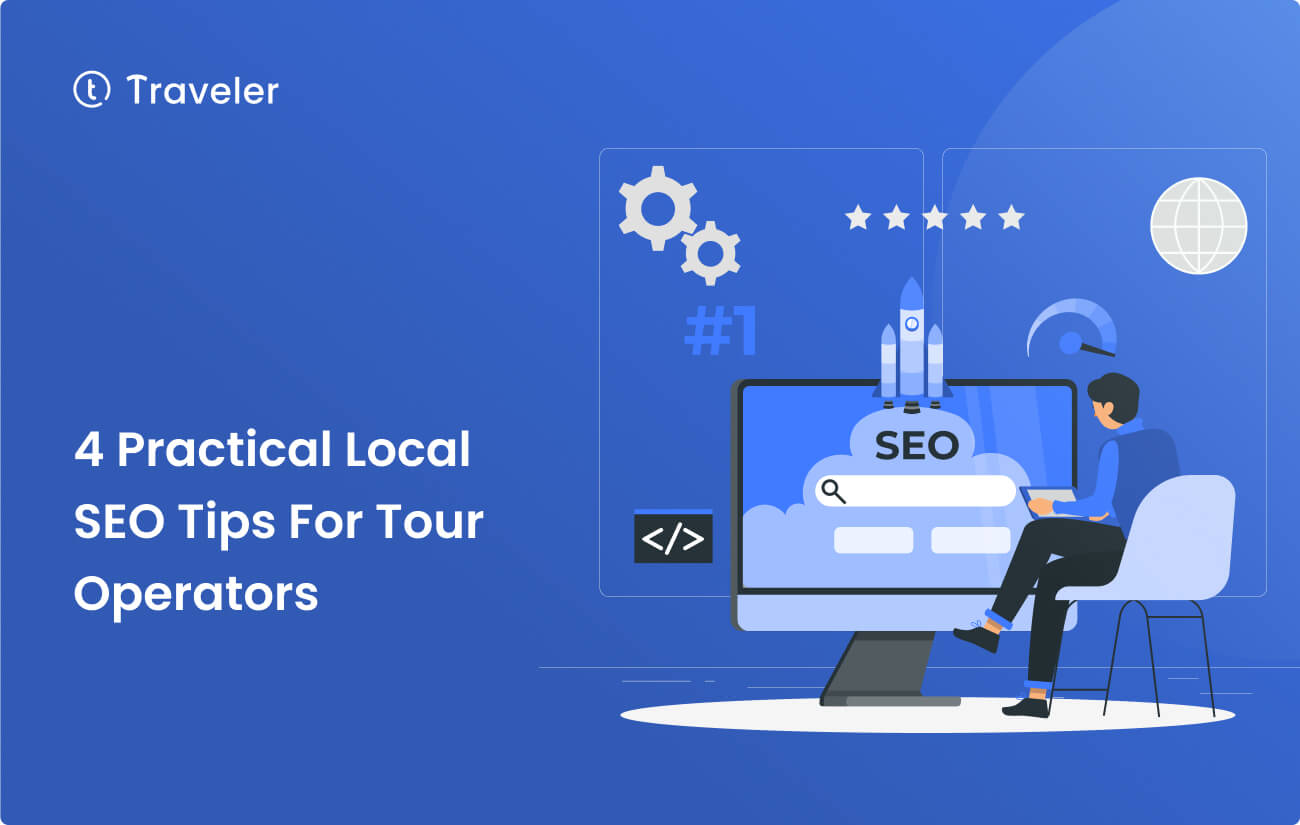
Table of Contents
SEO has become a necessity in driving organic traffic to tour and activity operators’ websites, as online bookings now account for a significant 73% of total bookings. This makes SEO crucial in attracting viewers, generating leads, and ultimately converting them into buyers.
To improve their local SEO game, tour operators can take actionable steps such as optimizing on-site elements like keywords and mobile responsiveness or implementing off-site strategies such as backlink building and content optimization.
In this article, we’ll dive deep into these strategies in detail. But before that, let’s first explore the definition and importance of local SEO tips for tour operators and activity providers.
Let’s jump in!
What is SEO?
SEO stands for Search Engine Optimization — the practice of enhancing your website’s visibility on search engines like Google and Microsoft Bing.
In simpler terms, it involves improving your website to increase its chances of appearing in search results when people search for:
- Products you sell
- Services you provide
- Information related to your area of expertise.
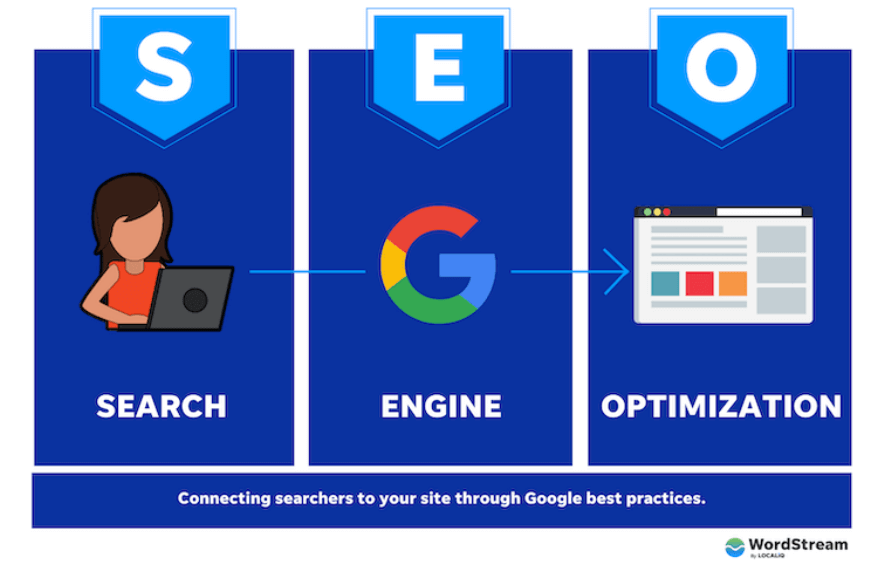
Optimizing your website for search engines helps improve the visibility of your pages and increase the likelihood of getting clicked on.
Ultimately, the gold of SEO is to attract website visitors who can potentially become customers, clients, or a loyal audience that keeps coming back for more.
The difference between SEO and Local SEO
The main difference between SEO and Local SEO is the target audience and geographical focus.
As mentioned above, SEO involves improving your website’s visibility and search ranking in general with a broader target audience.
On the other hand, Local SEO also aims to improve search ranking. Still, it focuses explicitly on users searching for products or services within a particular geographical area, such as a city or region, to attract local customers.
Besides, local SEO strategies are tailored to optimize a website’s visibility in local search results, including local directories, maps, and location-based search queries.
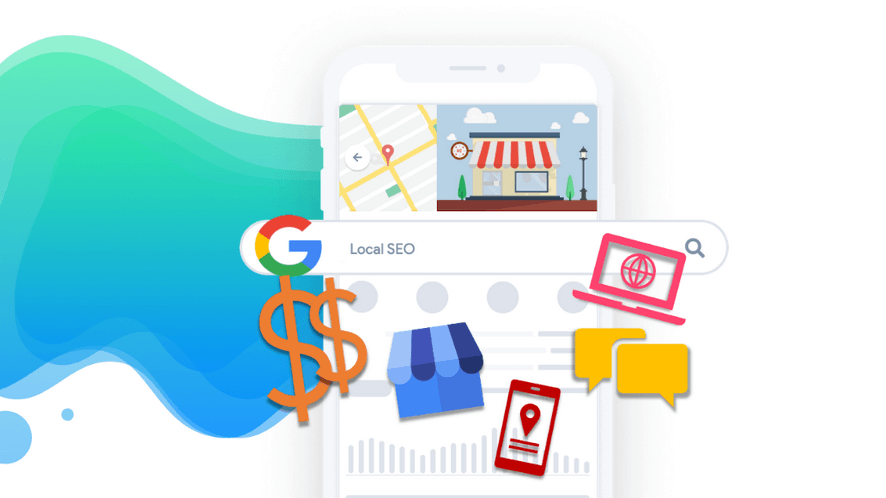
Tip #1: Claim your Google My Business (GMB) listing
What is Google My Business (GMB)?
Google My Business (GMB) is a free online tool offered by Google that empowers businesses to create and manage their online presence on Google, encompassing Google Maps and Google Search. It serves as a comprehensive platform for businesses to start a business profile and input essential information such as:
- Business name
- Location
- Phone number
- Website
- Photos
- Hours of operation
- Customer reviews.
Additionally, Google My Business facilitates businesses to publish updates, photos, and offers, as well as engage with customers through messages and respond to customer reviews.
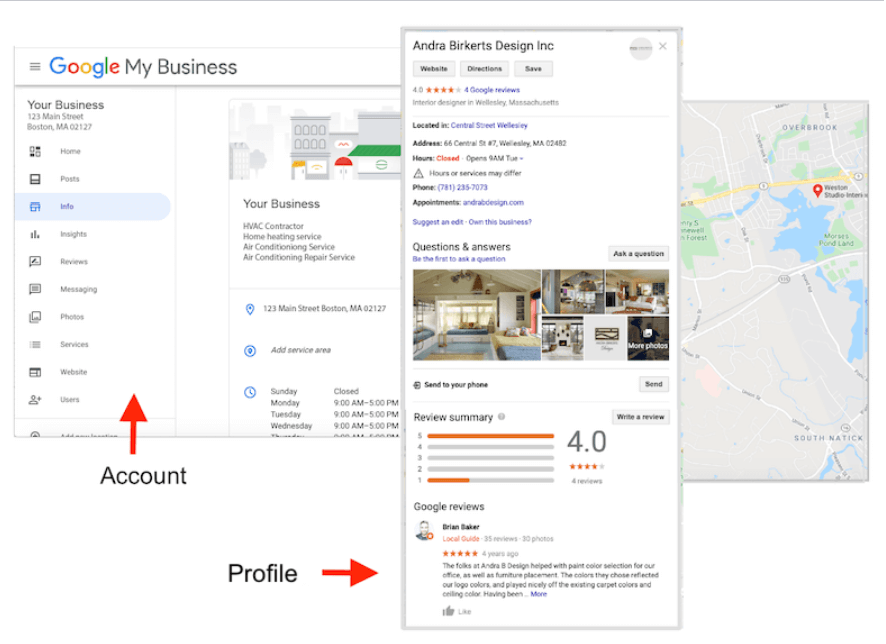
For local travel businesses, GMB is a vital tool that aids in appearing in local search results, showcasing their services, and engaging with potential customers.
By optimizing their Google My Business profile, tour operators can enhance their online visibility, establish credibility, and attract more customers locally.
In general, GMB acts as a valuable resource for businesses to manage their online presence and interact with customers effectively, making it an indispensable component of any local SEO strategy.
Why do tour operators need GMB?
Want to know why having a Google My Business (GMB) profile is a game-changer? Let us tell you! 😊
1. Increased Online Presence: First and foremost, GMB is your gateway to creating and managing your online presence on Google, including Google Maps and Google Search. This means potential customers can easily find and connect with your travel business. Score!
2. Enhanced Credibility and Informed Decision-Making: Secondly, with a GMB profile, you can showcase vital information about your business. This helps establish credibility and gives potential customers the details they need to make informed decisions when booking a tour.
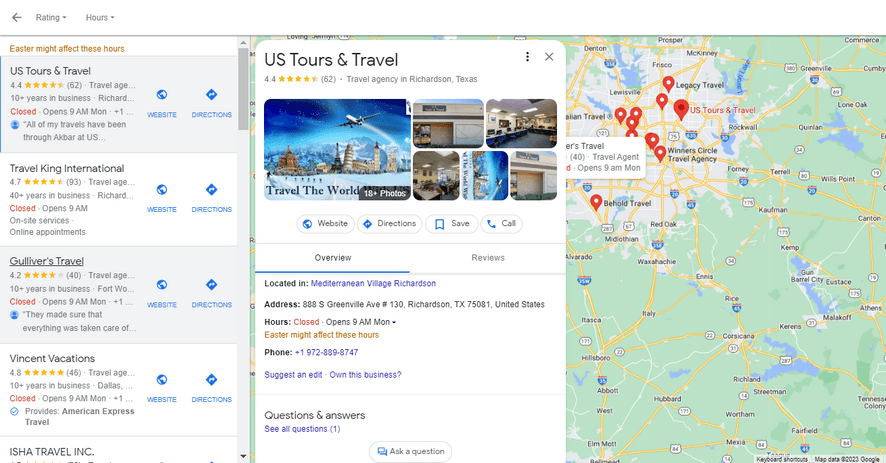
3. Improved Customer Engagement and Bookings: GMB lets you engage with customers through messages, respond to customer reviews, and post updates, photos, and offers. You get to interact with your customers, address their inquiries or concerns, and promote your services. The result? Better customer engagement and more potential bookings.
4. Gain valuable insights: Google and Google My Business is a treasure trove of useful data and insights from online users and customers.
Utilise GMB to gain in-depth information on how users find your business, whether through search engines or Google Maps. These insights enable you to understand customer behavior better and optimize your online presence for maximum effectiveness.
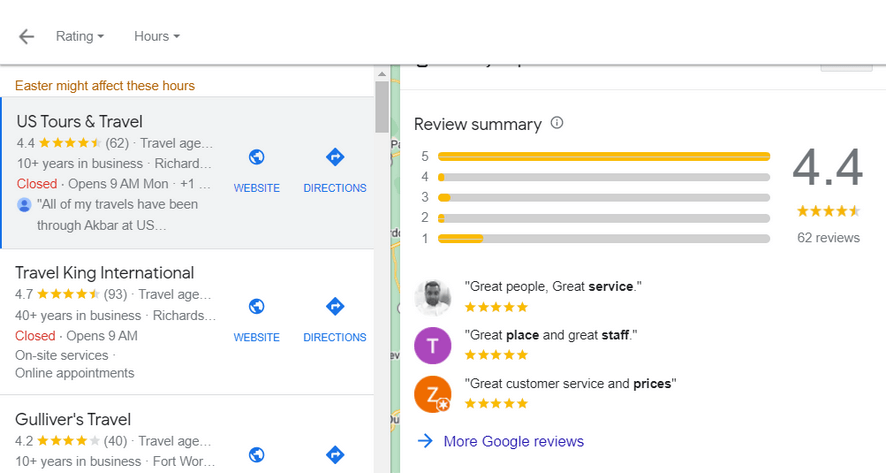
5. Positive Impact on Local SEO Efforts: But wait, there’s more! An optimized GMB profile can also work wonders for your local SEO efforts. When determining local search rankings, Google considers the information and activity on GMB profiles. Hence, a rocking GMB profile can boost your online visibility and attract more local customers.
Step-by-step process to claim and optimize GMB listing
If you already have a Google My Business account, feel free to skip to the optimization section. If not, here’s how to add or claim your location in the GMB listing. Please note that Google occasionally updates its interface so that the wording may vary slightly.
Follow these easy steps:
Step #1: Go to google.com/business.
Step #2: Click on “Manage now.”
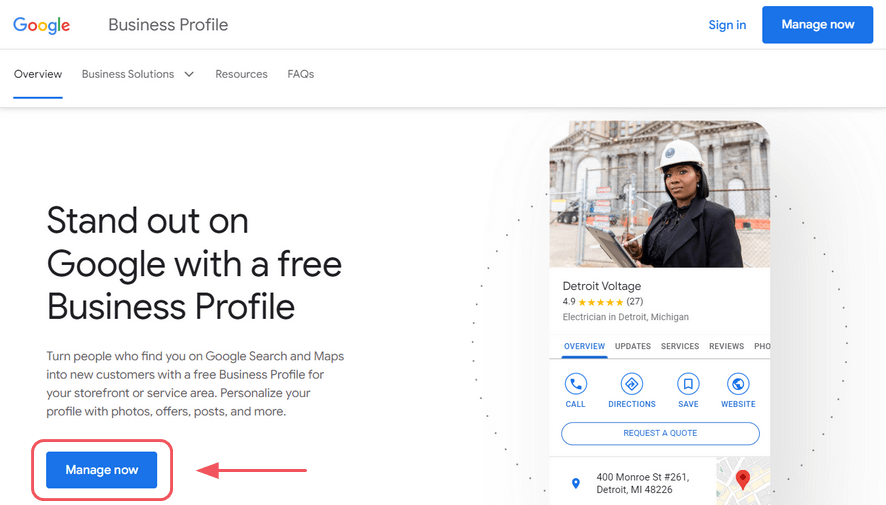
Step #3: Enter your business name and click “Continue.”
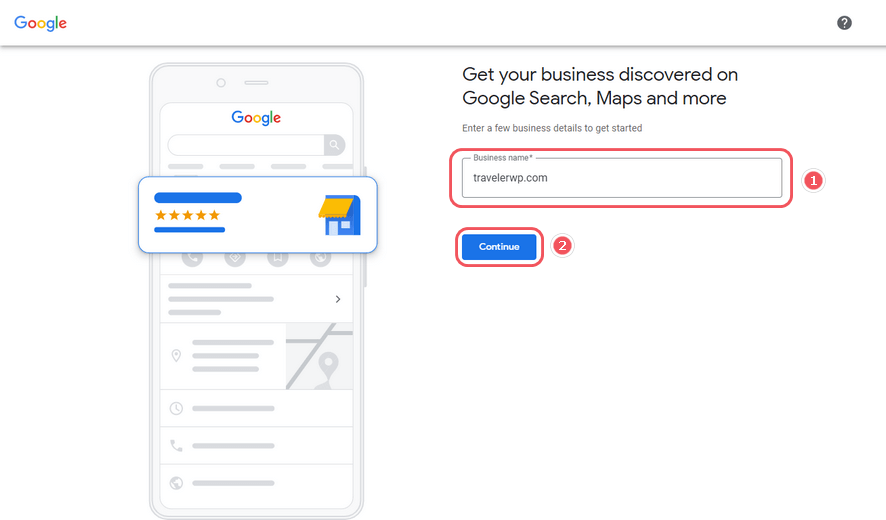
Step #4: Choose the most accurate primary business category that describes what you do.
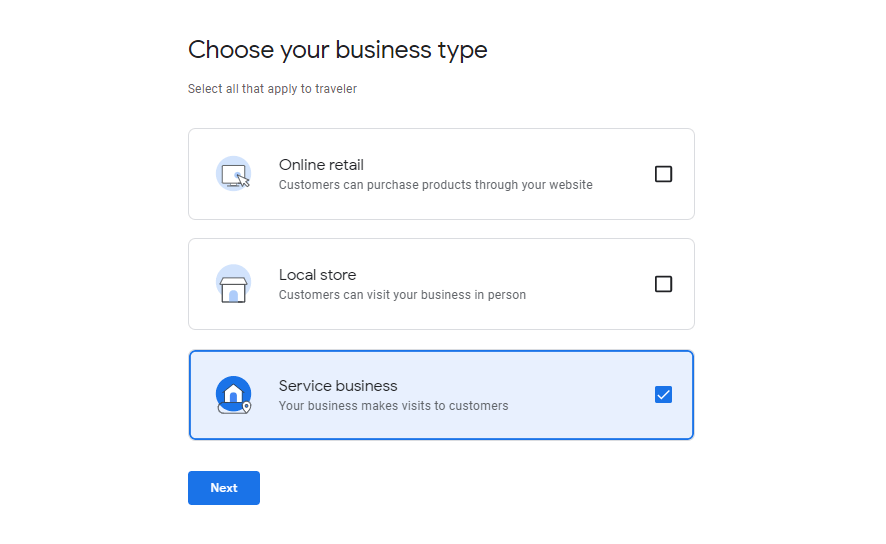
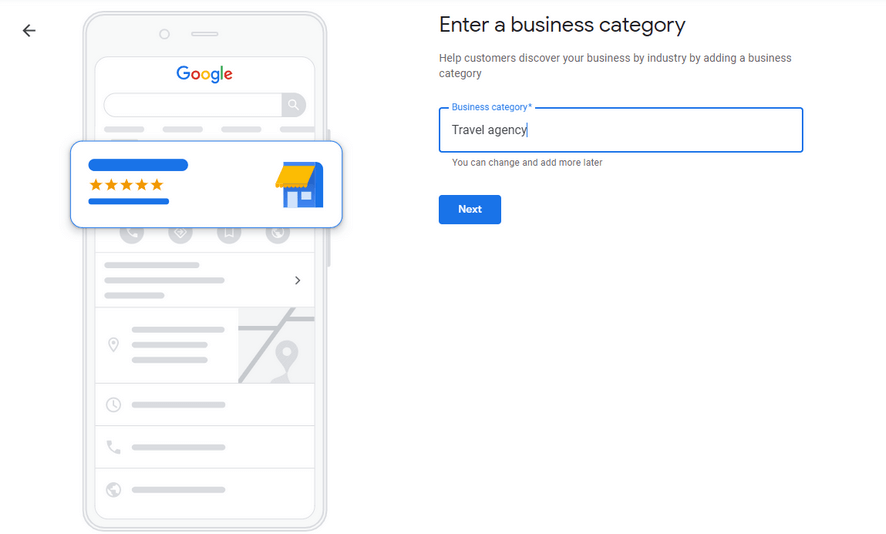
Step #5: Provide your address.
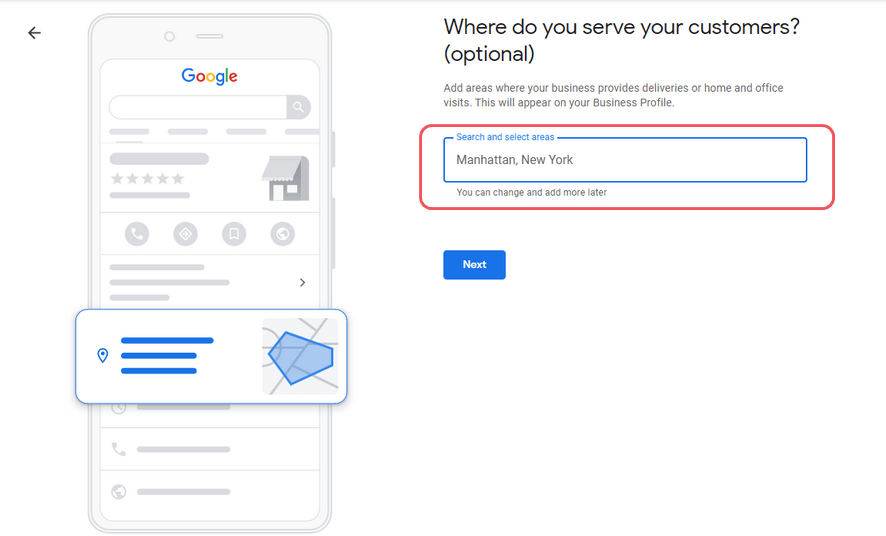
Step #6: Now, add your phone number and website URL
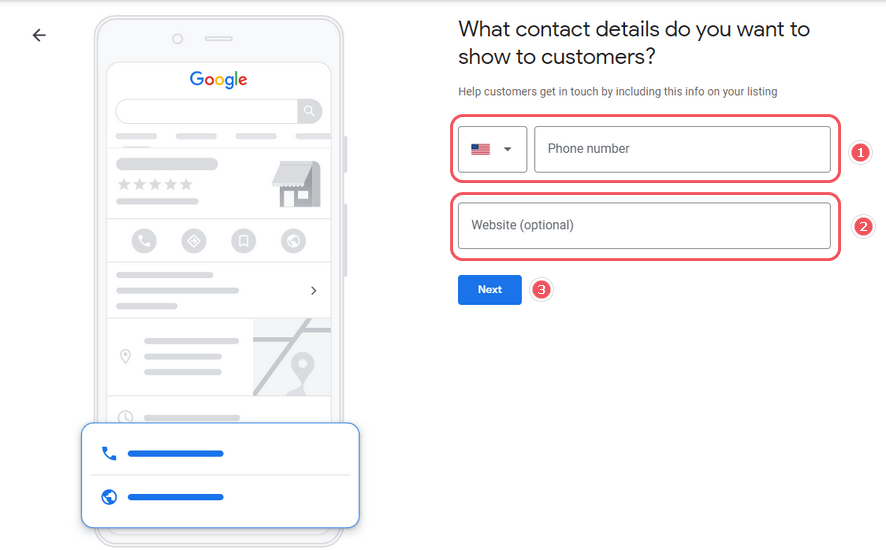
Step #7: Verify your business ownership through the verification process provided by Google.
How to optimize GMB listing
Great news! It’s time to optimize your GMB profile to ensure you’re getting the most out of it. Here’s how
to optimize your profile. Consider these key elements:
- Use your real business name. Avoid adding extra keywords, as it goes against Google’s Terms of Service and may result in penalties.
- List a local phone number. This serves as a signal that you’re a legitimate local business. If you use a call tracking number, enter it in the primary slot (that’s what users will see). Put your actual local number in the secondary slot.
- Double-check your hours of operation to ensure they’re accurate.
- Write a compelling description that lets people know who you are. Avoid stuffing it with keywords, as it doesn’t affect your search ranking.
- Photo: Upload plenty of high-resolution photos, including exterior, interior, and product shots. You can read more at “Tips for business-specific photos on your Business Profile”, released by Google. Besides, your photos section is not only a crucial part of setting up your listing but also vital for ongoing maintenance. To make your listing stand out, start with at least a few images, including a compelling cover photo and your logo.
Here’s a pro tip: regularly add images of smiling faces in your tour groups. Google loves fresh content, both on your listing and website, and will reward you for it!
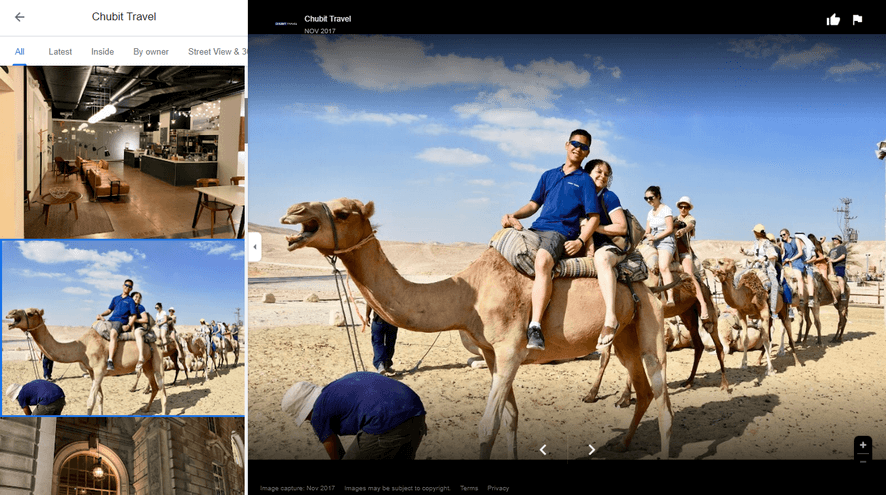
Video: If you have videos, feel free to upload them too! Just remember that they must be shorter than 30 seconds and smaller than 100 MB.
Real-life examples
Check out this fantastic example from the Hellenic Holiday travel agency! They’ve gone above and beyond to build customer trust by providing comprehensive details about their business, including their impressive 10 years of experience in the tourism industry. And that’s not all – with an outstanding 100% 5-star review rating, it’s clear that their quality of service is top-notch and leaves every customer satisfied.
Besides, with just one glance at the couple’s happy image, customers are excited to click and view the website. It’s the perfect visual representation of the unforgettable experiences that Hellenic Holiday can provide.
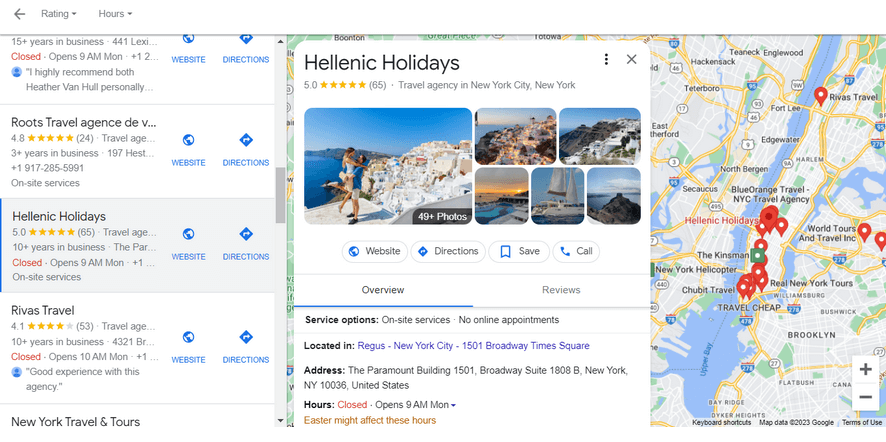
Tip #2: Optimize your website for Local SEO
Why does a travel agency need to optimize website for Local SEO?
1.Boost Your Online Presence: When you optimize your tour operator’s website, it’s more likely to rank higher in search engine results, making it more visible to potential customers. This increased visibility can lead to more organic traffic and higher chances of attracting new customers to your website. In fact, 50% of all web traffic comes from organic searches.
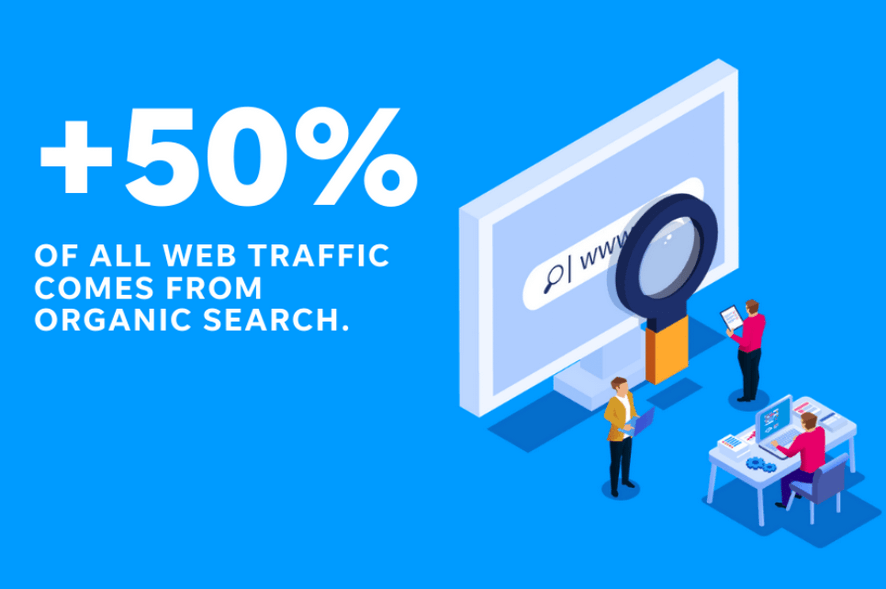
2. Attract Targeted Traffic: Website optimization also involves targeting specific keywords and optimizing content, helping you attract highly relevant traffic to your travel website.
3. Stay Ahead of Competitors: In this competitive travel market, having an optimized website can give you an edge over your competitors. Therefore, if you have a website optimized for search engines, mobile devices, and user experience can help you stand out and attract more customers than competitors with poorly optimized websites.

4. Build Your Brand: A well-optimized website can contribute to your branding efforts as a tour operator. Your website should reflect your brand’s identity, values, and offerings, helping you establish a strong online presence and build trust with potential customers. Consistent branding across your website creates a cohesive and professional image, setting you apart from your competitors.
Keyword research for Local SEO
When you’re describing your products and services, don’t forget to attach location-based modifiers to those keywords in your listings, social media profiles, and website pages. Including keywords that are relevant to your travel industry as well as your specific location on your website is important.
For example, if you run a travel agency, you can target keywords like “luxury cruises to the Caribbean” but also include location-specific keywords like “all-inclusive resorts in Cancun” or “beach hotels in Miami.”
Besides, make sure to strategically place geographically related keywords in the titles, headers, image tags, body, and meta descriptions of your website pages to increase your local visibility.
1.Find local SEO keywords
Need help finding local SEO keywords? You need to put yourself in the shoes of a potential customer in your niche. Think about their biggest priorities and what they would likely search for. Understanding your customer is the best way to market your business to them.
2.Utilize Google Trends
Google Trends is an excellent tool for looking at the number of searches for a specific keyword over time. You can even narrow down the geographic location and length of time for a more accurate reading.
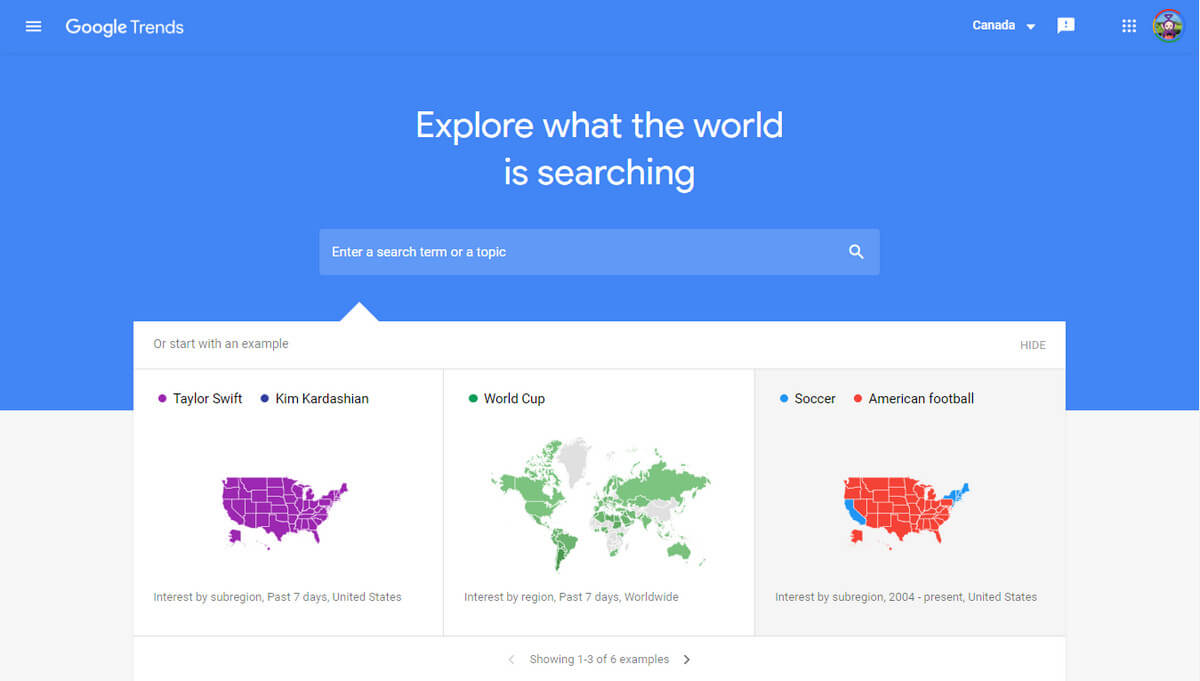
3. Partner with a Local Digital Marketing Agency
When you work with a local digital marketing company for your SEO needs, they can help you identify the best location-specific keywords to optimize your content. They have the expertise and knowledge to ensure your website is optimized for local searches and can attract more customers to your business.
On-page optimization techniques
When optimizing your travel agency’s website for local SEO, there are some vital on-page techniques to keep in mind, and they’re not as complicated as they may sound!
1.Title tag: These are HTML tags that define the title of a web page, and it’s important to ensure they include relevant keywords and location modifiers. For example, instead of just a generic “Tours and Travel Services” title tag, you could go for something like “Top Tours and Travel Services in [Location]” to really optimize for local searches.
2. Meta description: It’s essential to make sure your meta descriptions include keywords and location information. And most importantly, you should provide a compelling preview of what users can expect from your page. This way, you can encourage more click-throughs and drive traffic to your site.

3. URLs: It’s important to use SEO-friendly URLs that include relevant keywords and location information. Instead of something generic like “www.travelagency.com/page1,” try something like “www.travelagency.com/[Location]/page1” to really optimize for local searches. It’s a small change that can make a big difference in your local SEO efforts!
4. Internal link: this is another crucial aspect of optimizing your website for local SEO. By creating a strategic internal linking structure, you can guide users and search engines to relevant pages within your site. You should use descriptive anchor texts that include keywords and location information to really boost your local SEO efforts.
5. Content optimization: Last but not least, let’s talk about content optimization. This is all about incorporating relevant keywords and location modifiers in your headings, paragraphs, and image alt tags.
Creating high-quality, informative, and engaging content that appeals to both users and search engines is key to optimizing your website for local SEO.
Mobile Optimization for Local SEO
With the 85% increase in mobile device usage surpassing desktop in just 7 years, mobile optimization is critical for tour operators. And along with the increasing number of local searches conducted from mobile devices (think “travel agency near me”), Google now indexes the mobile version of a business’s website instead of the desktop version.
In addition, user experience plays a major role in ranking. If users have to pinch and zoom, face slow load times or need help finding the information they’re looking for, Google may not show your site in local search results.
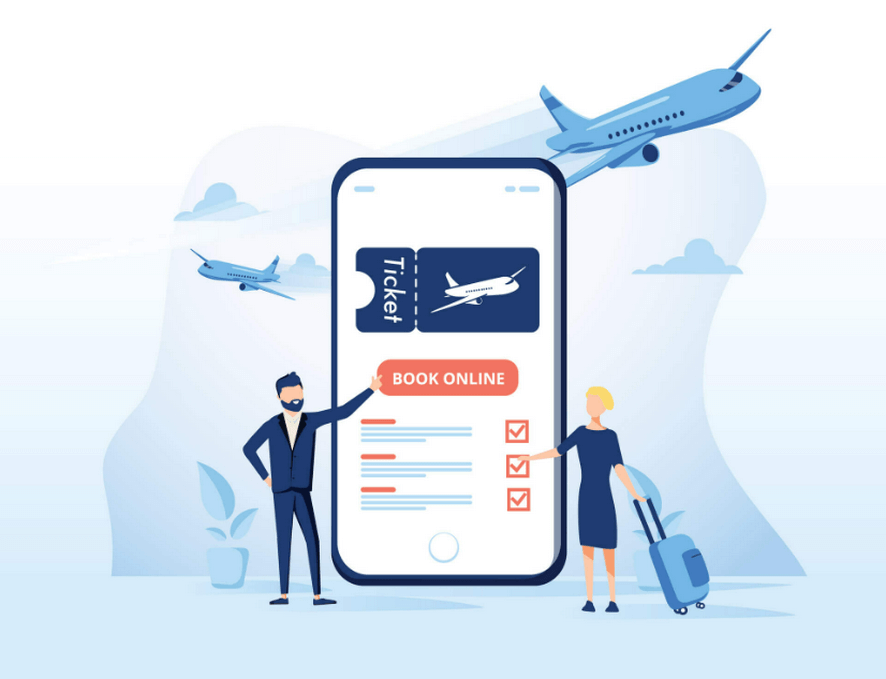
That’s why it’s crucial to ensure that the experience of discovering, learning about, and contacting your business is seamless on mobile, just as on desktop. Ideally, your website should be responsive, showing and functioning consistently across devices. This way, you can improve your website ranking and attract more potential customers.
Tip #3: Build local citations
They’re basically online mentions of your business name, address, and phone number (NAP). You can find them on various platforms like business directories, websites, and apps such as Yelp or Yellow Pages. The cool part is that besides helping people discover local businesses online, citations can also improve your local search engine rankings.
Local online searches are a big deal for businesses. They’re super helpful because they allow search engines to verify the legitimacy of your business. When your business name, address, and contact information are consistent and easily found online, search engines can trust that your travel business is legit and provides excellent service.
According to BrightLocal’s 2022 Consumer Review survey, a whopping 99% of consumers used online searches to find local businesses in the last year. And get this, 78% of consumers searched for local businesses online more than once a week! Therefore, having a solid local SEO strategy with accurate citations can really boost your chances of success.
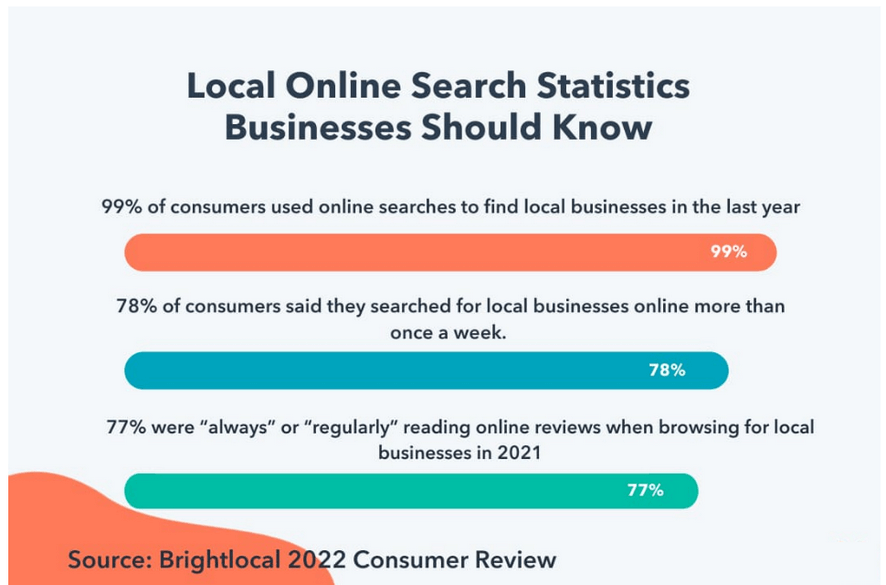
Step-by-step process to build local citations
If you’re interested in building local citations for your travel business, here are some simple steps you can follow:
1. Make it easy with data aggregators
Submitting your business’ name, address, and phone number (NAP) to countless online directories can be time-consuming. Luckily, there’s a solution: data aggregators. These companies collect NAP information and distribute it to hundreds of websites, saving you valuable time and effort.
Some popular data aggregators include Foursquare, Localeze, Factual, and Infogroup. To boost your local citations for SEO, simply search for your business on these sites and claim it if it’s already featured. If not, submit your business listing along with the correct NAP.
2. Get listed on core sites.
Submitting your NAP to core sites like Yellow Pages, Facebook, Yelp, Apple Maps, Yahoo Local, and Bing Places is crucial. Before submitting, ensure that these sites are relevant to your business and worth your effort by visiting them and checking the types of companies featured in their directories.
3. Tap into industry-specific and local websites
Once you’ve submitted your NAP to core sites, expand your reach by submitting to directories specific to your industry. For example, if you’re a hotel, be present on TripAdvisor.
Additionally, remember to explore hyper-local directories such as the local Chamber of Commerce or other business association websites in your area.
4. Think outside the box with unstructured citations
Unstructured citations, such as blog posts, reviews, and articles about your business, can significantly boost your local SEO. While they may require more effort, they’re not impossible to pursue.
One strategy is to search for supplier pages on Google. Many businesses have supplier pages that link to the companies they supply or those that supply them. Make a list of suppliers and perform a site search to see if they already mention your business on their website.
Another resource is HARO (Help A Reporter Out), which connects journalists with sources for news stories. You may get cited in their upcoming articles by answering journalists’ questions or providing quotes.
Tip #4: Get customer reviews
Customer reviews play a crucial role in local SEO, as they can greatly impact your business’s online reputation and search engine rankings. Positive reviews can attract more customers and boost your credibility, while negative reviews can have the opposite effect. Here are some tips on how to effectively get customer reviews for your business:
1. Provide exceptional service: The first step in getting customer reviews is to provide excellent service or products to your customers. Customers who have a positive experience are more likely to leave a review.
2. Ask for reviews in person: When customers are at your business or after a successful transaction, ask them directly if they would be willing to leave a review. Be polite, and genuine, and avoid any pressure or incentives that may violate review guidelines.
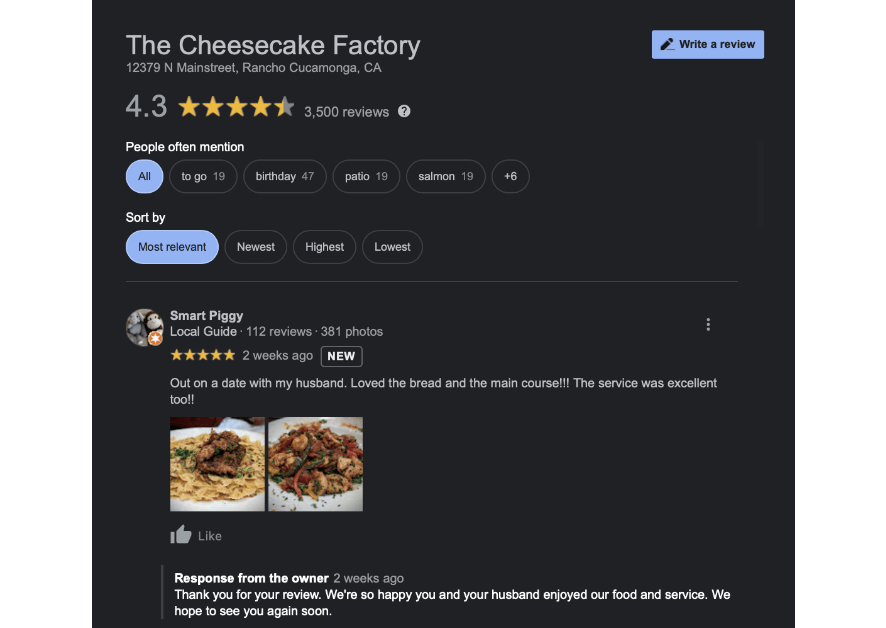
3. Send follow-up emails: After a purchase or interaction with your business, you can send a follow-up email thanking the customer and kindly requesting them to leave a review. Make sure to include direct links to your review platforms for their convenience.
4. Utilize social media: Engage with your customers on social media and ask for reviews there. You can also create posts or stories promoting reviews and encouraging customers to share their feedback.
Boost your tour operator business with local SEO tips! Optimize your website using the best WordPress travel theme for SEO. Try our Travelwp Premium Theme now and unlock your business’s potential!
Conclusion
As a tour operator looking to make a mark in your local community, incorporating effective local SEO strategies can significantly benefit your business.
Embracing these practical local SEO tips we’ve covered above can help you connect with more potential customers in your area and drive meaningful growth for your tour operator business. So, take advantage of the opportunities that local SEO can offer and take proactive steps to make your business shine in your local market!
